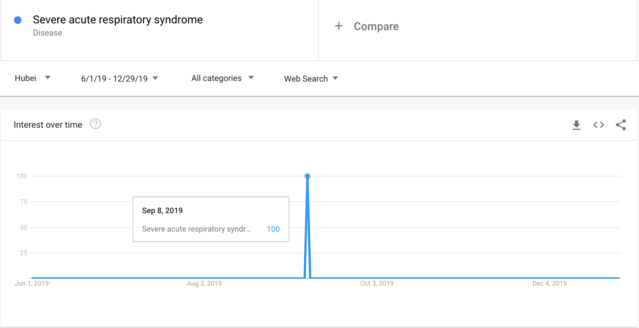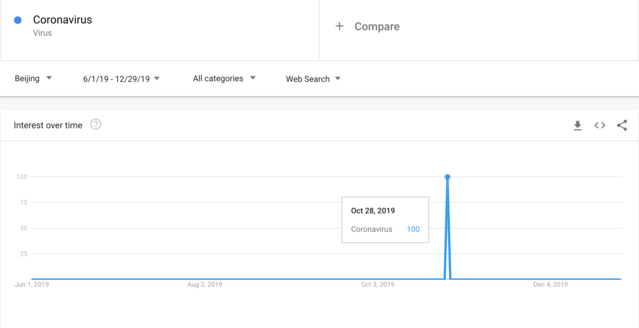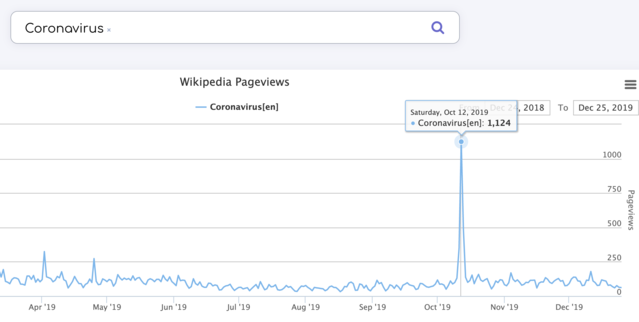Coronavirus Disease 2019
Mysterious Blips Raise Questions About COVID-19 Timeline
What was known and when was it known?
Posted May 11, 2020 Reviewed by Lybi Ma
A May 5th, 2020 article by Van Dorp et al in the journal Infection, Genetics, and Evolution suggests that COVID-19 made the jump from animals to humans sometime between October 6 and December 11, 2019. The authors arrived at this timeline by analyzing the genetic sequences of many diverse strains of the virus to determine the “Time of the Most Recent Common Ancestor” (tMRCA) of 7666 different strains of the virus.
Because the earliest documented case of COVID-19 in China was November 17, according to Chinese government reports, the very first infections probably occurred near the beginning of Van Dorp et al’s estimated window (the first patients exhibited symptoms up to two weeks following exposure).
Indeed the authors of the May 5th article cite findings by other researchers estimating tMRCA dates as early as August 2019.
Given these estimates, it is natural to ask, when did medical professionals and/or government officials first become aware that a novel coronavirus had likely emerged?
Due to the political sensitivity of this question, we will likely never know the answer for certain, but careful analysis of online search data provides tantalizing hints.
Both Google and Wikipedia keep meticulous records of terms and phrases searched on their respective sites, showing what search terms in the past were of interest, and in some cases, where these search terms were of interest. If people in a position to know had started to see evidence of a new disease outbreak, it is possible, even likely, they would have searched Google and Wikipedia for relevant information.
Here’s what Google and Wikipedia’s records show.


Google Trends, which displays “normalized” search traffic for specific queries, localized to specific geographic regions, showed two “blips” in search interest in China for the terms “Coronavirus” and “SARS’, one in Hubei province ( where Wuhan is the capitol) in September 2019 and one in Beijing in October 2019. Because the data are normalized (given as ratios of search to the maximum number of searches for that term) only Google knows the actual raw numbers of searches for any given term, but the normalized data do give an indication of changes in the relative volume of search.
Wikipedia, which does reveal the raw numbers of searches for particular terms, showed a jump in baseline search interest in “Coronavirus” from under 100 per day to 1124 searches on October 12, 2019. On the same day, Wikipedia searches for Severe Acute Respiratory Syndrome (SARS-novel coronavirus is now also called SARS-CoV2) jumped from a baseline of 200-300 searches per day to 1334 per day. Wikipedia does not publish the geographic origin of searches on their sites, only they know where the queries originated.


Taken together, the “blips” in Google and Wikipedia search records suggest a heightened curiosity about SARS/Coronavirus in early Fall 2019, one to two months before the first confirmed cases.
It is important to emphasize that these findings might be unrelated to the pandemic because there have been repeated spikes in search interest both SARS and coronavirus on both Google and Wikipedia over the past 15 years; the recent “blips” in query volume could be just random statistical anomalies that do not indicate what medical or government officials knew or when they knew it. Also, given the incendiary politics surrounding the pandemic and charges of "coverup" circulating, it would also be irresponsible to imply that—even if the blips were "real"—that elevated search interest, all by itself, was proof of malicious intent on anyone's part.
I agree with my brother, former Harvard Virologist Dr. William Haseltine, who asserted that undue focus on the origins of the pandemic dangerously distracts us from the far more important task of quickly bringing the pandemic to an end.
Still, the timing of the “blips” relative to Van Dorp et al's genetic analyses is intellectually intriguing: Sometimes a cigar, as Freud is reported to have said, is just a cigar.
But is a blip always just a blip?


